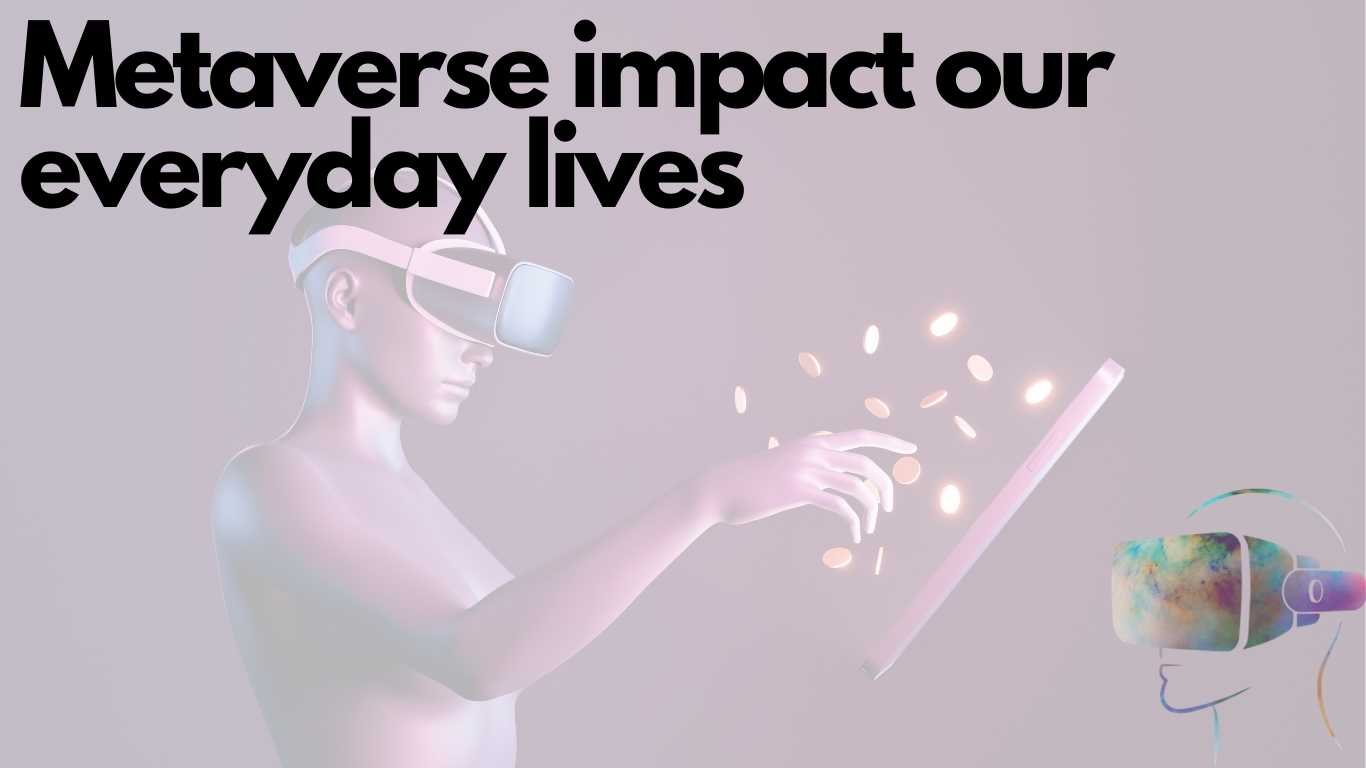How will the metaverse impact our everyday lives?
Manjeet
. 6 min read
Imagine a world where individuals may live, work, go shopping, and interact with one another without ever having to leave the physical comfort of their couch. The term for this type of reality is the metaverse.

The Metaverse is a platform for spatial computing that provides digital experiences as an alternative to or replica of the real world. These digital experiences include essential aspects of civilized societies, such as social interactions, currency, trade, economy, and property ownership.
Who exactly is in charge of the Metaverse?
In a nutshell, neither one person nor all people. The longer and more comprehensive response is as follows: the figurative proprietors of the metaverse are the people who built the tools, created the software, created the worlds, created the 3D models, created the video games, created the users, and created the investors.
The most current data indicates that by the year 2020, 83.7 million people in the United States would utilize augmented reality on a monthly basis. By the year 2023, it is anticipated that there will be 110 million individuals making use of it.
How does one navigate their way through the Metaverse?
Are you ready to go on this exciting adventure into a brand-new world? You shouldn't get too enthusiastic just now because Zuckerberg's envisioned metaverse is still a ways off. According to his projections, the majority of the metaverse-related goods that Meta is working on will not be available for at least the next ten to fifteen years. On the other hand, how will we be able to get access to the metaverse if (or when) it actually becomes a thing?
Hardware will play an important part in access to the metaverse as more and more consumers invest in virtual reality headsets that can whisk them away from their living rooms and into the world of their choosing. Although Facebook already owns the Oculus headset and has hinted that it would launch the next iteration of the product in 2022, a number of other companies, such as Samsung and HP, have developed their very own virtual reality (VR) headsets.
Users will don their headsets in order to connect to the metaverse using their internet connection when they want to access the metaverse. On the other hand, there are probably less interesting methods to experience the metaverse for those people who do not have access to a costly headset.
The effect of the metaverse
• The metaverse will usher in a new era of advertising by introducing novel narrative experiences realized through the utilization of 3D technology.
• The interoperable concept of the Metaverse project gives companies the ability to digitally manage and participate in any event.
• Despite geographical limitations, brands are able to communicate with an audience located all over the world by utilizing Metaverse as part of the ecommerce business architecture.
• Metaverse also enables digital wallets, which enables businesses to manage transactions smoothly across their virtual ecosystem.
The tourism and travel industry
Virtual tourism is one of the Metaverse use cases that exemplifies the most innovative thinking. People who are physically unable to travel long distances may benefit from this particular application of technology since it enables them to travel in a virtual environment. The Metaverse development of immersive digital experiences with augmented and virtual reality is the most significant advance in the travel industry, according to the opinions of industry professionals.
Not only can you view the location that was captured with the 360-degree virtual tour, but you can also virtually be there in the specified place with effects that are accurate to the real world.
For example, Thomas Cook has introduced a Virtual Reality Holiday called "Try before you Fly," which enables prospective travelers to virtually experience their chosen locations before booking a trip there.
Education and Intellectual Acquiring
The educational and intellectual potential of the Metaverse is just as fascinating as its other possible applications. The learning experience has been taken to a whole new level thanks to the combination of VR and Metaverse effects. Students can now watch live experiments that make use of higher-quality and more extensive knowledge resources.
Students from New York City are shown in a video that was released not too long ago learning about astronomy aboard a digital spaceship rather than in a traditional classroom. A new era of schooling is just being started, and this is its very first day. Students from all over the world are able to gain knowledge from a centralized digital location in Metaverse, which eliminates linguistic boundaries as well as the social and cultural hurdles that traditionally exist between them.
Working from one's own house
The old method of conducting business has been severely disrupted as a direct result of the Metaverse. The Metaverse virtual business architecture is currently being utilized by a great number of companies. These virtual office organizations include companies such as Nike, Intel, YouTube, and McDonald's, in addition to emerging businesses such as Gravity Sketch and Upland.
Investing in real estate
The capability of Metaverse to deliver its customers the very best virtual reality experience is one of the company's most significant advantages. It should not come as a surprise that a niche in the real estate market that focuses on employing Metaverse may be profitable.
When using the Metaverse property tour possibilities, real estate agents do not need to travel to the place, and customers do not need to waste time travelling to dozens of different properties. In point of fact, prospective buyers are able to take a tour of the real estate offered in the Metaverse and explore all of the alternatives in real time.
In the field of healthcare, use cases of the Metaverse have opened up new doorways for the distribution of low-cost pharmaceuticals that have improved outcomes. In the post-pandemic Metaverse, patients and physicians are able to speak with one another in virtual 3D clinics, which has given rise to the notions of telemedicine and telehealth.
The metaverse presents a number of challenges in addition to its extensive list of potential advantages. The following are some examples of them:
1. Harassment and Cyberbullying: The mental health and well-being of those who participate in the metaverse has already garnered significant media attention. Young adults and adolescents are still susceptible to being bullied online. In actuality, the impacts of cyberbullying have been well-documented and can vary from low self-esteem to suicidal ideation, particularly among teenagers. This is particularly true of the repercussions of cyberbullying. Because the human experience in the metaverse is the same as our experience in the physical world, specialists believe that pain and suffering are just as real and intense in the metaverse as they are in the physical world. This is due to the fact that the human experience in the metaverse is as true as our experience in the physical world.
2. Problems with Mental Health Other dangers are harder to prevent in a virtual context, such as mental health problems. For example, the majority of free-to-play games are supported by advertisements. Someone with malicious intent could hypothetically replace advertisements with pictures that induce nausea or even epileptic fits in the target audience. It is possible for these visuals to be transmitted to a virtual reality headset.
3. Theft of Identities: A great number of authorities are concerned that if stringent safety measures are not put into place, it will be much simpler to steal someone's identity in the metaverse. In the real world, identity theft has already become a multibillion-dollar industry; according to recent studies, the total damages from identity theft amount to $24 billion.
4. Businesses That Collect Unauthorized Data Legitimate businesses also collect your personal information; this is not illegal. On the other hand, virtual reality has the potential to increase the bar for data collecting to a level that some people may not be able to reach. For instance, third parties may hypothetically be able to gather more sensitive personal data via virtual reality headsets. Examples of such data include voiceprint data, biometric data, and even facial geometry.
5. Attacks using ransomware Ransomware is a type of malicious software that encrypts your data and prevents you or anyone else from accessing it. It will then display a message asking you to pay a specified amount of money in order to regain access to your data; thus, the term "ransomware" describes this type of malicious software. Your profile in the metaverse will contain a lot more sensitive information in addition to a lot more general information than a profile on a normal social network would.
"The" metaverse does not yet exist. This is the gist of the matter. A metaverse is presently understood to be a set of evolving technologies that offer the next degree of interaction between the virtual and physical worlds.
A metaverse is not independent of the types of devices used to access it, nor is it controlled by a single manufacturer. It is an independent virtual economy that runs on digital currencies and non-fungible tokens (NFTs).
More Stories from
The Most Useful AI Tools That Will Assist You in Your Work and Creativity
Productivity is widely acknowledged to be one of the most critical factors in our life by all of us. It is vital to achieve one's goals. There are a few AI technologies that have been developed so far that can assist with increasing productivity. They ar
The impact that meteorites and asteroids have had on the universe, both positive and negative
An impact by a meteorite takes place when a stony, metallic (usually iron), or frozen body that had been circling the Sun crashes into the surface of the Earth after travelling through the atmosphere
How will our life be without computers?
We have come to rely on computers for a considerable amount of time, and I believe that most people would have a difficult time imagining what our lives would be like if we did not have access to them.


.jpg?width=250&aspect_ratio=16:9)
.jpg?width=250&aspect_ratio=16:9)